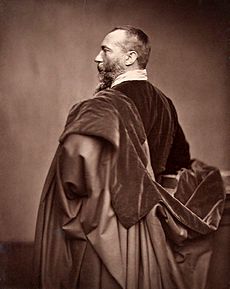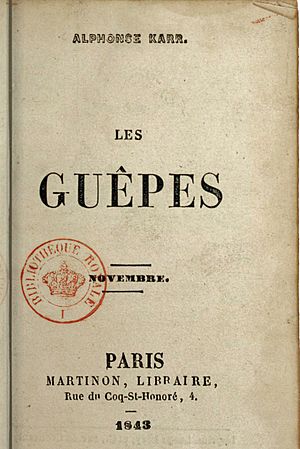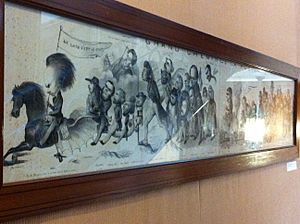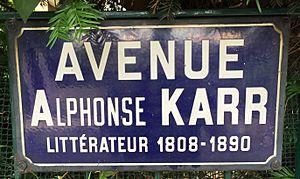Jean-Baptiste Alphonse Karr facts for kids
Quick facts for kids
Jean Alphonse
|
|
|---|---|
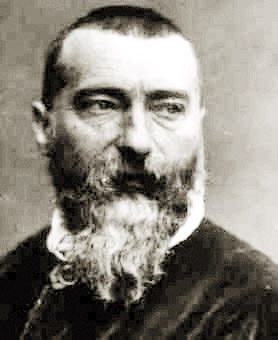
Alphonse Karr by Antoine Samuel Adam-Salomon, c. 1876
|
|
| Born | 24 November 1808 |
| Died | 29 September 1890 (aged 81) |
| Occupation | Critic, journalist, novelist |
| Years active | 1834–1880 |
| Spouse(s) |
Clémentine Renard de Mentule
(m. 1834; div. 1836) |
| Children | 1 |
| Relatives | Carme Karr (niece) |
Jean-Baptiste Alphonse Karr (born 24 November 1808 – died 29 September 1890) was a French writer. He was known as a critic, journalist, and novelist.
Contents
About Alphonse Karr's Life
Alphonse Karr was born in Paris, France. His father, Henri Karr, was a German pianist and composer. Alphonse went to school at the Collège Bourbon. After finishing his studies, he became a teacher there.
Karr started writing novels, and some of them were based on his own life. His first novel, Sous les Tilleuls (which means Under the Lime Trees), came out in 1832. It was a romantic story about his own experiences. The next year, he wrote Une heure trop tard (An Hour Too Late). He wrote many other popular books after that.
Some of his other famous works include Vendredi soir (Friday Evening, 1835) and Le Chemin le plus court (The Shortest Way, 1836). These also shared stories from his life. Geneviève (1838) is thought to be one of his best stories. His book Voyage autour de mon Jardin (Journey Around My Garden, 1845) was also very popular. Other books he wrote were Feu Bressier (1848) and Fort en thème (1853). This last book even helped to inspire changes in education.
In 1855, Karr moved to Nice, a city in France. There, he enjoyed his love for growing flowers. He even had new types of flowers named after him, especially a kind of dahlia. He helped start the business of selling cut flowers along the French Riviera. Karr also loved fishing. He wrote about his fishing adventures in books like Les Soirées de Sainte-Adresse (Evenings at Sainte-Adresse, 1853) and Au bord de la mer (By the Sea, 1860). His memories, called Livre de bord (Logbook), were published in 1879–1880. He passed away in Saint-Raphaël.
Karr's Family
Alphonse Karr had a brother named Eugène, who was a skilled engineer. His niece, Carme Karr, also became a famous writer and journalist. She was also a suffragist, meaning she worked for women's right to vote.
Alphonse Karr married Louise Estelle Clémentine in 1834. They had one child, a daughter named Thérèse, who was born in 1834.
Alphonse Karr's Writings
Novels
Here are some of the novels Alphonse Karr wrote:
- Sous les Tilleuls (1832)
- Une heure trop tard (1833)
- Vendredi soir (1835)
- Le chemin le plus court (1836)
- Geneviève (1838)
- Voyage autour de mon Jardin (1845)
- Feu Bressier (1848)
- Fort en thème (1853)
- Les Soirées de Sainte-Adresse (1853)
- Histoires Normandes (1855)
- Au bord de la mer (1860)
- Une poignee de verites (1866)
- Livre de bord (1879–80)
Journalism
In 1839, Alphonse Karr became the editor of Le Figaro, a well-known newspaper. He had already written many articles for it. He also started his own monthly magazine called Les Guêpes (which means The Wasps). This magazine was known for its sharp and funny writing. It made him famous for his "biting wit" and memorable words. The first issues of Les Guêpes were published from 1839 to 1843. Karr tried to bring the magazine back from 1852 to 1855, but it was hard because the government had strict rules about what could be published.
In 1848, he also started a newspaper called Le Journal.
Memorable Quotations
Alphonse Karr is remembered for many things he said. One of his most famous sayings is plus ça change, plus c'est la même chose. This is often translated as: "the more things change, the more they stay the same." It means that even when things seem different, some basic things always remain the same.
Alphonse Karr's Legacy
Alphonse Karr was one of the French artists and writers who were made fun of in a drawing by Benjamin Roubaud. The drawing was called "Grand Chemin de la Postérité" (Great Road of Posterity). In the drawing, Karr's head is on the body of a wasp. This was a joke about his magazine, Les Guêpes (The Wasps).
One of Karr's short stories, Les Willis, was used as the basis for an opera. The opera was called Le Villi (1884) and was written by Giacomo Puccini.
A type of bamboo plant, Bambusa multiplex Alphonse Karr, was named in his honor.
Many roads and places have been named after him, including:
- Rue Alphonse Karr in Paris
- Rue Alphonse Karr in Nice
- Avenue Alphonse Karr in Saint-Maur-des-Fossés
- Place Alphonse Karr in Barentin
- Allée Alphonse Karr in Châlons-en-Champagne
There is also a college named Collège Alphonse Karr in the town of Saint-Raphaël.
See also
 In Spanish: Jean-Baptiste Alphonse Karr para niños
In Spanish: Jean-Baptiste Alphonse Karr para niños
 | Aaron Henry |
 | T. R. M. Howard |
 | Jesse Jackson |


